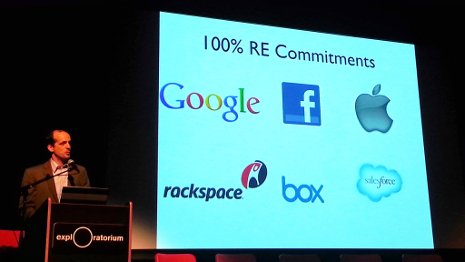Several data center providers have received low grades for commitment to renewable energy in the latest report on the energy fuel mix of the internet by Greenpeace.
This is the first time the environmental activist organization has included multi-tenant data center providers in its report, which in previous years examined only the household-name tech giants, such as Google, Twitter, Facebook and Amazon.
The point of the initiative has been to persuade the world's largest data center operators to use their energy buying power to influence energy suppliers to replace reliance on coal and nuclear generation with renewable alternatives.
The report, released Wednesday, includes wholesale data center providers Digital Realty Trust and DuPont Fabros, as well as retail colocation players Equinix, TelecityGroup and Verizon Terremark. By including some of the world's largest providers, Greenpeace acknowledged that internet infrastructure was not limited to the companies most commonly associated with today's high-tech industry.
Gary Cook, senor policy analyst at Greenpeace and one of the report's main authors, said if the effort to build a “green internet” was to be successful, data center providers had to be involved. “These are obviously huge players in the market,” he said.
Expanding the list of companies examined to 19 has expanded the report's scope from 80 data centers two years ago to 300 in the latest version.
Here is the latest report card by Greenpeace


Neither of the data center providers did exceptionally well on Greenpeace's scorecard. While acknowledging Redwood City, California-based Equinix's effort to make the fuel mix behind the energy that powers its data centers more transparent with an upcoming “green web portal” with a 'B' for energy transparency, the report gave the world's largest retail colocation provider 'D's for lacking in commitment to renewable energy and mitigation of carbon emissions, as well as renewable energy deployment and advocacy.
An Equinix spokesperson could not provide comment in time for publication.
San Francisco-based Digital Realty, the largest landlord of wholesale data center space in the world, received 'D's in all four categories. “If [Digital Realty] made a commitment to renewable electricity, working to phase in clean energy in collaboration with its customers across the globe, the company would become a driving force for building a green internet, far bigger than even Google is currently,” the report read.
Commenting on the report, Steve Kundich, senior VP of development services at Digital Realty, said the company has actively pursued reduction in the amount of energy its facilities consume. “Digital Realty has long history of being an early adopter of advanced energy-saving design strategies in our new ground-up data centers and in retrofitting our existing data centers,” he said in an emailed statement.
The company pursues options to save energy before building a new data center, which typically revolve around cooling technologies and depend on environmental conditions in the area. “Once we begin the planning stages with a new customer, before the space is even leased, we offer proactive advice on how the space should be utilized, including energy saving techniques,” Kundich added.
“Power bills are usually sent directly to our customers, which means we do not get access to energy bills, given the confidentiality that is required by our customers, and then respected by everyone here at the company.”
Authors of the Greenpeace report acknowledged the substantial progress in energy efficient data center and server design the industry has made over the past several years. “However, given the scale of predicted growth in the energy footprint of the online world, all major online companies must factor access to renewable sources of electricity into any meaningful sustainability strategy,” they added.
Many of the other technology giants that have been evaluated in previous reports by Greenpeace have improved their scores. The organization acknowledged more active investment and advocacy for renewable energy by the likes of Facebook, Apple and Google.
Notable exceptions are Amazon Web Services and Twitter. The world's largest provider of public cloud infrastructure services and the world's largest microblogging website scored exceptionally poorly, each getting failing grades in most areas of evaluation.
“Those companies, most notably Amazon Web Services, are choosing how to power their infrastructure based solely on lowest electricity prices, without consideration to the impact their growing electricity footprints have on human health or the environment,” the report read.
Amazon representatives did not respond to a request for comment.

